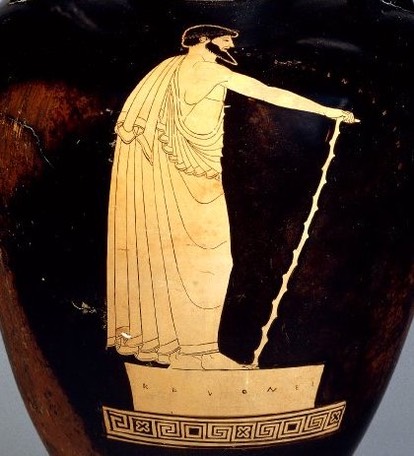Daux, BCH 63 (1939), 168-169
Dekmos Iounios of Rome, the son of Dekmos: rhetor
Date:
1st century BC
Edition:
[ἐπειδὴ Δέκμο]ς Ἰούνιος Δέκμου υἱ-
[ὸς Ρωμαῖος, ἀνὴρ] καλὸς καὶ ἀγαθός, “ῥή-
[τωρ, ἐπιδα]μ̣ήσας εἰς τὰν πόλιν
[ἁμῶν, ἐποιήσ]ατο τάν τε παρεπιδα-
5 [μίαν καὶ ἀνασ]τροφὰν ἀξί[α]. τοῦ τε
[αὐτοσαυτοῦ δ]άμου κα[ὶ τᾶς ἁ]μετέ-
[ρας πόλιος καὶ] ἀ̣ποκαθή[μενος] ἐν τῶι
[γυμνασίωι] ἀκροάσε[ις ποιε]ίμενο[ς]
[πλείονας εὐ]δοκίμ[ησε· ἐπὶ ο]ὖν τού-
10 [τοις· δεδόχ]θαι τᾶι [πόλει] τῶν Δελ-
[φῶν· ἐπαινέ]σαι Δέκμ̣ον Ἰούνιον·
[δεδόσθαι δὲ] αὐτῶι τε [κα]ὶ ἐγγόνοις
[προξενίαν, π]ρομαντείαν, προδικί[αν],
[ἀσυλίαν, ἀτ]έλειαν, προεδρίαν ἐ̣[μ]
15 [πᾶσι τοῖς ἀγώ]νοις οἷς ἁ πόλις τί[θητι]
[καὶ γᾶς καὶ οἰ]κίας ἔν[κτησιν καὶ]
[τἄλλα τίμια ὅ]σα καὶ το[ῖς ἄλλοις προξέ]-
[νοις καὶ εὐεργέ]ταις τ[ᾶς πόλιος].
Translations (en):
Since the Roman Dekmos Iounious, son of Dekmos, a good and virtuous man, being a rhetor and having dwelt in our city, showed a behaviour worthy of his people and our city and obtained good fame delivering a number of lectures in the gymnasion; therefore, for these reasons, it has been resolved by the city of Delphi to praise the Roman Dekmos Iounios, son of Dekmos, and to bestow on him and his descendants the proxeny, priority in access to the oracle and in legal judgements, immunity for his possessions, exemption from taxes, privileged seating at the games that our city organizes, the right to possess lands and home and all further privileges granted to the other proxenoi and benefactors of the city”.
Translations (it):
“Poiché Dekmos Iounios romano, figlio di Dekmos, uomo buono e valoroso, retore, avendo soggiornato nella nostra città, tenne un soggiorno e una condotta degne del proprio popolo e della nostra città e, trattenendosi nel ginnasio, ottenne buona fama tenendo delle audizioni in gran numero; per queste cose dunque, è sembrato bene alla città di Delfi di lodare Dekmos Iounios romano, figlio di Dekmos e di concedere a lui e ai discendenti la prossenia, il diritto di precedenza nella consultazione dell’oracolo e in giudizio, l’immunità per i propri beni, l’esenzione dal pagamento delle tasse, la proedria negli agoni che la città bandisce, il diritto di possesso di terra e casa e tutti gli altri onori che appartengono anche agli altri prosseni ed evergeti della città.”
Commentary (en):
The gymnasium of Delphi made frequent use of the services offered by intellectuals, artists, poets, and teachers offering guest lectures for the young audience. These occasional visitors were rewarded with honors and privileges by the city.
It is sometimes difficult to define whether these performances were addressed only to a juvenile public or also to a refined audience (σχολαί).
Commentary (it):
Il ginnasio di Delfi affidava frequentemente delle lezioni straordinarie a conferenzieri, artisti, poeti, insegnanti stranieri. Questi visitatori d’occasione, che spesso offrivano gratuiti servigi, erano ringraziati con onori e privilegi da parte della città e spesso è difficile dire se le loro prestazioni siano rivolte unicamente all’uditorio giovanile oppure se si configurino come delle lezioni aperte, rivolte anche all’ambiente colto e di alta levatura (σχολαί).



